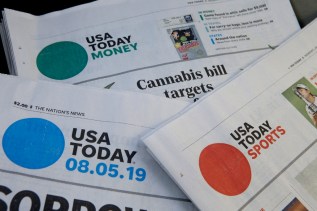
EXTRA Picking up where the U.S. Justice Department’s antitrust suit against Google left off, USA Today-publisher Gannett Co. this week filed its own lawsuit against the search giant in U.S. district court in New York. The 80-page complaint covers much the same ground as DOJ’s filing, accusing Google of using anticompetitive tactics to achieve an illegal monopoly over the digital advertising market. But the Gannett suit seeks to make explicit what is only implicit in the DOJ action: News publishers are being directly harmed by Google’s actions.
As discussed here in January, the DOJ’s complaint makes passing reference to the harm to publishers from artificially low online ad prices resulting from Google’s dominance of both the sell-side and buy-side of the digital advertising ecosystem. But its main focus is on the harm to competition in the electronic marketplace for bidding on and selling digital ads from Google’s alleged monopoly, not on its downstream impact on publishers. Gannett, on the other hand, is focused on recovering direct monetary damages from Google for its alleged past and ongoing misappropriation of online advertising revenue.

“Publishers are not suffering because readers demand less online content. Growing numbers of U.S. readers get their news online, and spending on online advertising to reach those
readers has exploded,” the Gannett complaint says. “Rather, publishers do not see the growing ad spending because Google and its parent Alphabet unlawfully have acquired and maintain monopolies for the advertising technology (“ad tech”) tools that publishers and advertisers use to buy and sell online ad space.
Google controls how publishers sell their ad slots, and it forces publishers to sell
growing shares of that ad space to Google at depressed prices. The result is dramatically less
revenue for publishers and Google’s ad-tech rivals, while Google enjoys exorbitant monopoly
profits.”
The Gannett lawsuit also comes on the heels of a report by antitrust authorities in the European Union that, like the DOJ suit, recommends breaking up Google’s monopoly in the digital advertising market through the forced sale of assets.
Meanwhile, the Senate Judiciary Committee last week voted 14-7 to approve the Journalism Competition and Protection Act (JCPA) that, somewhat ironically in light of the DOJ’s lawsuit, would a create a temporary safe harbor from antitrust rules for news publishers to allow them to negotiate collectively with Google and other online platforms over terms for the use of publishers’ content in search results and social media.
The JCPA has been down that road before, or course. It has been kicking around Capitol Hill since 2019 without ever quite making it to a president’s desk. If it were to pass, however, in would put Google in a similar spot in the U.S. as it finds itself in Australia and the EU, each of which has enacted measures in recent years to force online platforms to secure licenses or to pay publishers directly for the use of their content online.
All of those developments, moreover, are playing out amid a growing movement in multiple jurisdictions to regulate the design and use of generative artificial intelligence technology, another market in which Google is a major player. Included in many of those proposals are new rules regarding the use of copyrighted material to train generative AI models such as Google’s Bard, which relied heavily on news publishers’ archives to fine-tune its AI-assisted search engine.
Google has faced complaints over its alleged anticompetitive behavior for years, of course. It has paid billions in fines and been forced into settlements and consent decrees with regulators in multiple jurisdictions for its sins, including for its behavior toward publishers and other copyright holders.
But the latest wave of legal and regulatory actions seek to go beyond merely altering or constraining Google’s behavior. Rather, they aim to fundamentally restructure many of the markets in which Google operates, whether through forced divestitures or by diluting Google’s market power by empowering other market participants.
As the European Commission’s competition chief Margrethe Vestager put it in recommending the breakup of Google’s ad-tech empire, “It’s a reflection of how pervasive Google is in this value chain that we think a divestiture is the only way to solve this.” Any less severe measures, she added, “would allow Google to continue doing what it has been doing so far, just under a different disguise.”
As we’ve noted here many times before, many of the issues publishers and other copyright owners have with digital platforms arise more from a structural imbalance in the mechanics of value capture in digital markets than with any deficiency in copyright law. Restructuring those markets from the ground up could ultimately do more to right the balance than would more stringent tools to enforce copyrights.
